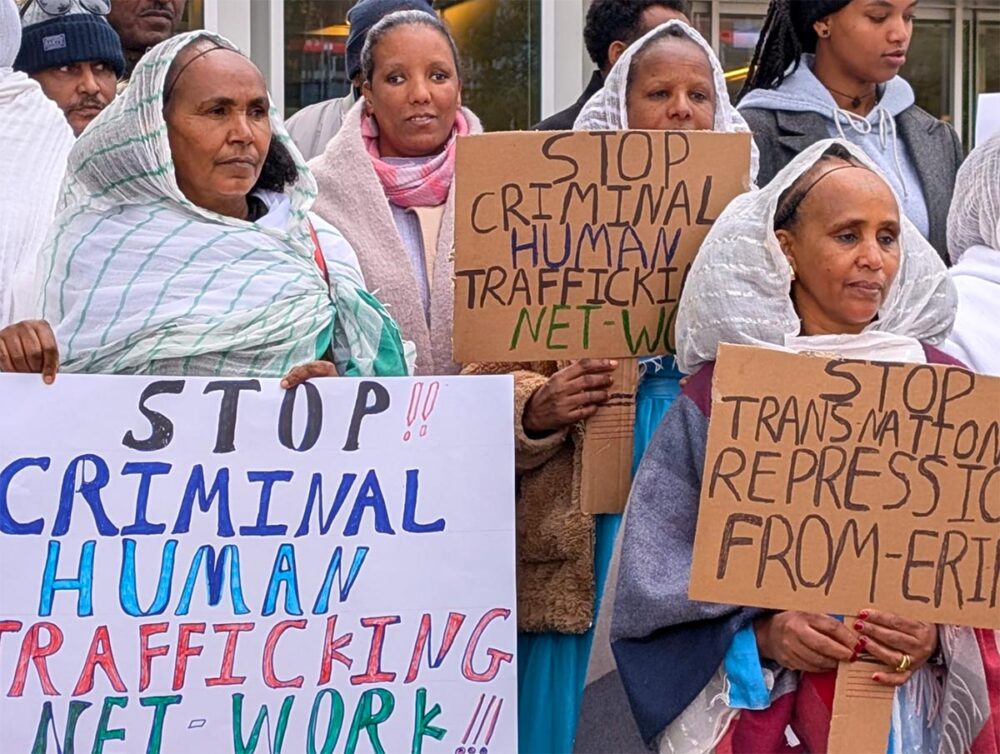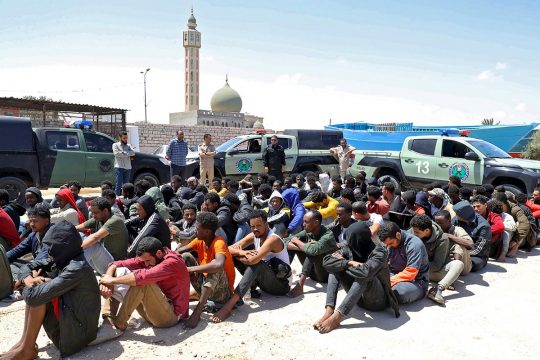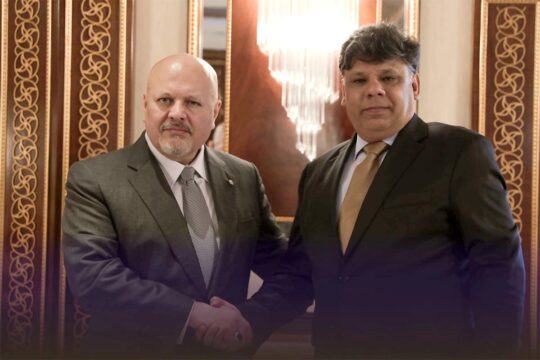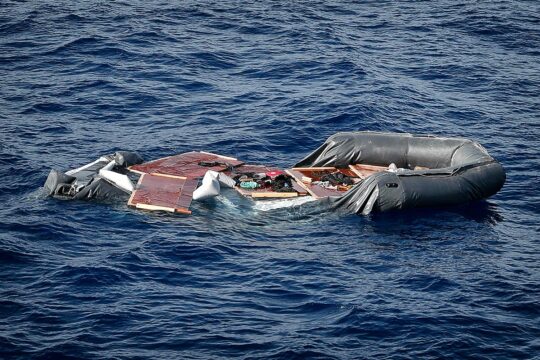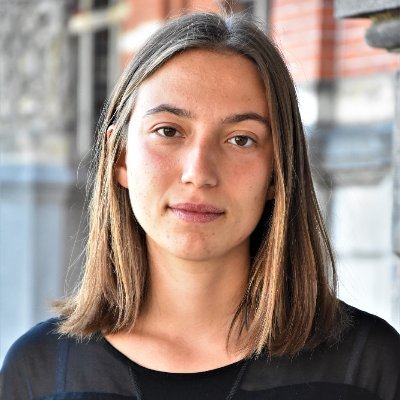“I had open wounds everywhere, blood, and I could not sit. The only thing I could think of was when am I gonna die, tomorrow it's going to be me. It's cruel.” On November 4, the judge in a Dutch court read the testimony of H, an Eritrean man who was held in a Libyan detention camp. He arrived in Italy in 2017, aged 35, and now lives in the Netherlands. His testimony, along with those of other victims and witnesses, is part of the largest-ever Dutch human smuggling trial, which started on November 3 and should last until November 26 with a verdict expected in January 2026. Eritrean national Amanuel Walid, also known as Tewelde Goitom, is accused of leading an international criminal network that detained, tortured, raped and extorted Eritrean refugees in Libya.
Dutch and international journalists, lawyers and Eritrean civil society filled the courtroom and an additional gallery of the court of Zwolle, a city 100 km to the east of Amsterdam. This is one of the few trials in Europe dealing with an alleged high-profile human trafficker operating in Libya. And it is the first Dutch trial that can look at the whole migration journey, from Eritrea to Ethiopia, Libya, and Europe, says Gerben Wilbrink of the National Public Prosecutor's Office to Justice Info. “That's really something which makes this case unique.”
The Netherlands could move forward because many Eritreans living in the country said they were extorted from Walid’s network. The suspect was extradited from Ethiopia to the Netherlands in October 2022, on accusation of participating in a criminal organisation involved in human smuggling, hostage-taking, extortion and sexual violence between 2014 and 2018. The network operated detention camps, mainly Bani Walid in Libya, where people were held and tortured until families in Europe paid ransoms of thousands of US dollars. 17 preliminary hearings were held in the case since January 2023.
The dark side of Eritrea
The 41-year-old suspect entered the courtroom escorted by police, his face seemingly emotionless. He wore jeans, trainers, and a blue puffer jacket fully zipped up. “I'm not the person you are looking for, I'm not Walid”, he leaned slightly forward, back curved, as he spoke through an interpreter. “Everything is in the hands of my lawyer, I don't speak the language, I don't know this country.” He denied the accusation and that he was ever in Libya. For the rest of the hearings, he invoked his right to remain silent.
Presiding judge René Melaard said that it was impossible to establish his real identity, as he was using a false passport, and they could not find any official documents. He added that the name provided by the suspect himself was not correct, and the file contained 20 different aliases used to call him. “Perhaps that's not the most important aspect of this investigation. What matters, of course, is whether or not you are the person that many witnesses say is the individual known as Walid”, said the judge.
Standing in front of the court, around 25 Eritreans demonstrated with banners demanding a halt to human trafficking networks. “Stop transnational repression from the Eritrean regime”, they chanted, calling for “an investigation into the link between the criminal network that perpetrated human trafficking and the Eritrean authority”. Since gaining independence from Ethiopia three decades ago, Eritrea has been led by dictator Isaias Afwerki. There are no civil liberties in the country, and people have to serve a long and brutal military service. VluchtelingenWerk, an organisation helping refugees in the Netherlands, estimates that 28.000 people with an Eritrean background live in the Netherlands. They often remain under threat and are forced to pay a 2% diaspora tax and other financial contributions to the Eritrean government, fearing consequences like denial of consular services or reprisal against their families, according to a 2017 report commissioned by the Dutch government.
Eritrean men and women from different parts of the Netherlands have followed the case over the years and gathered at the court to finally see the charges being discussed publicly. Among them was Tadese Teklebrhan, the chair of the Dutch NGO Eritrean Human Rights Defenders (EHRD). “We don’t have any experience of such trials in our country, so everybody is happy to be here”, he told Justice Info. Because of the widespread interest, the court is streaming the trial in 3 languages, Dutch, English and Tigrinya.
The trials and tribulations of Walid and Kidane
Since the fall of Muammar Gaddafi in 2011, Libya has become a transit route for migrants fleeing conflict and poverty to Europe. According to the researchers behind the book ‘Enslaved’, between 2016 and 2021, around 114,000 Eritreans arrived in Europe through Libya. They are estimated to have paid almost $1 billion to trafficking networks.
"We see Walid as one of the most prolific human traffickers on the central Mediterranean route," prosecutor Martijn Kappeyne van de Coppello told the judges. The prosecution obtained around 200 victims' statements, says Wilbrink. Around 30 testimonies were included in the indictment. They were chosen because they had a link to the Netherlands and the victims lived nearby and could be heard by the court, explains Wilbrink. “But if you look into the file and you read all the stories, it comes to thousands of people involved.”
The scope of the file is “quite extraordinary”, stated judge Melaard. There are 25.000 pages for an investigation that saw cooperation across borders. The Dutch investigation started in 2018, when prosecutors found out about extortion phone calls to relatives in the Netherlands. They soon joined forces with judicial and police authorities in Italy, as well as the United Kingdom, Spain, Europol, and since 2022, the International Criminal Court (ICC).
The case involved Walid, five other people located in the Netherlands and suspected of taking part in the extortions, and another traffickers’ leader, Kidane Zekarias Habtemariam. Kidane has been described by the Dutch police as “one of the most notorious and cruel human smugglers in the world”. Arrested in Ethiopia in 2020 together with Walid – who has been convicted on charges of human trafficking – he escaped a year later, only to be recaptured in Sudan in 2023. He was convicted of financial offences in the United Arab Emirates, and Dutch prosecutor Petra Hoekstra has requested extradition to try him for trafficking. After delays, he is now expected to travel soon, and the judges still hope to hear Kidane as a witness in the ongoing trial.
Dropped charges
Defence lawyer Jordi L'Homme did plead in a 30-page brief that Walid had already been tried for similar charges in Ethiopia, so he could not be prosecuted twice for the same offences. He argued that charges of money laundering should be dropped as they were not included in the extradition request to Ethiopia. And the defence also said that the prosecution “intended to respond to the global societal problem”, migration, through Dutch criminal law, and that “exceeds the reach of that law”. Moving her hands to underline her words, defence lawyer Simcha Plas concluded that the court lacks jurisdiction as the link to the Netherlands is not strong enough.
In a slim 3-page response, prosecutor Kappeyne van de Coppello said that the charges are not the same as in Ethiopia because they involve different victims. He argued the court has jurisdiction because some of the alleged crimes happened in the Netherlands, and asked the judges to first hear the merits of the case and then decide on it.
The panel of three judges agreed with the prosecution on these points, but decided to throw out money laundering and “hawala” (a traditional system of payment) offences, as they were not included in the extradition request.
A “life-threatening” journey
“It's about people and we should share their stories”, judge Melaard said before reading the victims’ stories one by one. “They deserve to be shared in public.” In the Dutch system, witnesses are not heard in court but by an investigative judge. Lawyers can ask questions, and all the material is discussed in public only when the trial officially opens.
The first testimony the judge read was that of an Eritrean girl who arrived in Messina, Sicily, on February 4, 2018, aged 15. No food or water was allowed on the boat crossing from Libya. “We couldn't bring anything with us, no phone. I can't swim, and we did not have lifejackets”, she told investigators. Like many other victims, she was rescued by the Italian authorities. “We were happy because there was water entering the boat, and we thought we would die.” 157 people were rescued, 128 of whom were Eritrean. The vast majority had scabies, and they all had been locked up in the warehouse near the Libyan town of Bani Walid. Their families had to pay often between 3 and 6.000$ in ransom to free them, said the judge. Once their families had paid, they would receive a code and be allowed to leave the camp and go to the coast. Many families struggled to raise that sum; some could not. “My mum had to beg everyone in the village for money: family, neighbours, unknown people”, said the girl.
On the second day of the trial, the judge read many other witness testimonies. They all shared similarities while shedding light on the different abuses in what the judge called the “life-threatening” journey from Eritrea to Europe. Most of the people had escaped the harsh Eritrean dictatorship travelling through Ethiopia, Sudan, and Libya, where they were kept hostage in the warehouse in Bani Walid, sometimes sold to Walid or to other smugglers. In Bani Walid, around 100 km off the coast, the fenced perimeter that was formerly hosting a chicken farm is composed of a yard and four big warehouses, each managed by a smuggler. Walid and Kidane were also living in smaller houses there. Their warehouses were connected to each other, and people could see what was happening in the other one through a hole in the wall. Well over a thousand people were crowded in Walid's warehouse. Many of the witnesses stayed for around 3 to 7 months.
Hell in Bani Walid
Walid controlled many dozens “kapos”, fellow refugees mostly coming from Eritrea who could not pay for the journey and were forced to work for him, hitting and torturing other refugees. Walid would mostly shout orders at them and stand by to watch. That’s how the witnesses said they knew he was in charge. People were hit with plastic sticks, hoses, and branches; some had molten plastic thrown on them. “They spray you with cold water and then they hit you and make you roll on the floor”, the judge read from E’s testimony, 16 years of age when he arrived in Augusta, Sicily, in 2017. He recounted that he could not walk on his own afterwards and had to be carried to the toilet, another occasion for the kapos to hit him. He also contracted tuberculosis and still bears visible scars. Witness Y told the investigators he was pulled up and left hanging from the ceiling with his hands down for 24 hours. “You can’t lie down to sleep because there is not enough space and you are hit to make more space for others”, the judge read from M’s testimony, a man in his mid-twenties when he arrived in Italy in 2017. Occasionally, the accused would allegedly hit people directly. “Walid hit me once, he said everybody had to sit, and I stood because I did not hear, and he hit me with a hose on my back”, said M.
Migrants and their families first paid for what they were told was the journey to the coast, but when they arrived in Bani Walid, they were forced to pay again. “That sounds like slavery”, commented the judge. Until their relatives paid, they had to line up for a phone call every single day. During the calls, they would be hit by the guards: “They want you to be crying or screaming”, said T, a woman in her thirties who travelled with her two small children, so that their relatives would pay more speedily. “I was hit on the back. I feel it on my back, but I also feel it in my heart.” The judge asked Walid whether that “awakened” something in him, but the accused remained silent.
The prosecutors estimate that each of the two smugglers earned at least $1 million per year in payments and ransoms. The judge read the testimony of L, the sister of a young boy who was trafficked in Bani Walid. She was extorted in the Netherlands. She and her parents had to pay twice. Her little brother would call and say, “I’m tortured, I’m abused, they are threatening to kill me, so please pay as soon as possible”, the judge read. “I started to cry, that was the only thing I could do. If I had the money, of course I would have paid because I wanted him alive”, the sister said.
Sexual abuse
The conditions in the warehouse were appalling, according to the witnesses. “There were lice and vermin, when you would wake up, you had to get rid of them”, said H in his testimony read by the judge. He was 35 when he arrived in Sicily in 2017. He recounted that they often received food once a day, a bowl of pasta to share among 8. 16-year-old E recalled weighing 30kg for 1m 70 of height when he arrived in Sicily. The witnesses saw people die due to hunger, beatings, diseases, and childbirth. In the testimonies, there are also multiple references to sexual abuse. Walid or the kapos would enter and call women out, they alleged. If the women refused to have sex, they would not be allowed to continue the journey, explained witness M. “You are powerless”, he said. Sometimes, women were forced to live with Walid for a few weeks, and some got pregnant.
Most of the witnesses recognised Walid and Kidane in the pictures, as the men they often saw running the warehouses. Some said they saw them working together sometimes, sharing boats and trucks, while the two men also had bosses above them, the Libyans.
After the families paid, the witnesses had to wait for their turn to travel to the coast. Many of them were loaded on trucks and driven for several days. Then, after some more waiting, they were forced onto rubber or wooden boats described as not “seaworthy”. But they had no choice, said H. The Libyans would accompany the boat for the first part and then leave it in the open sea. Since 2015, at least 34,000 people are reported to have died or gone missing in the Mediterranean while trying to reach Europe by sea, according to UN High Commission for Refugees.


